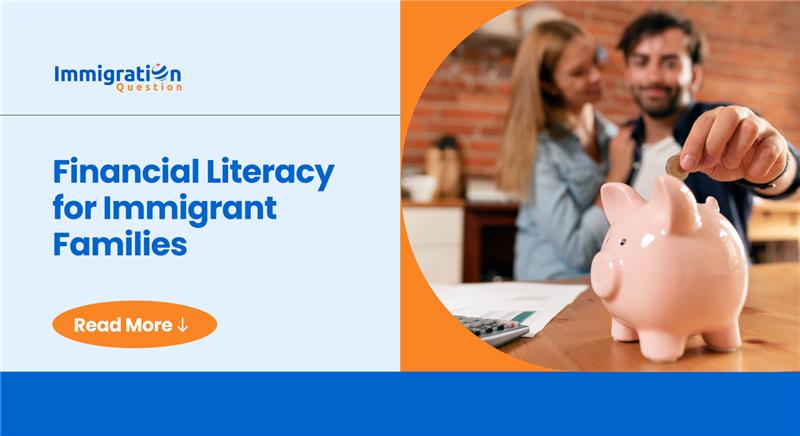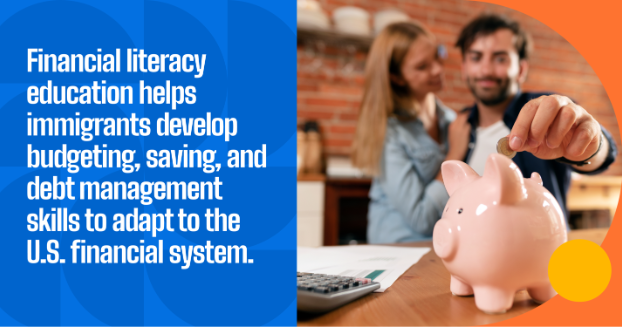In the United States., aggregate household debt increased by $212 billion at the end of 2023, with 77% of American households reported to have at least some form of debt. Financial struggles are even more pronounced among immigrant families, who face additional challenges in achieving economic stability in their new environment.
Today, financial planning has become more important than ever. However, many immigrant families have limited knowledge about personal finance. With a better understanding of money management and budgeting strategies, immigrant families can work toward financial security.
Importance of Financial Literacy
Financial literacy involves mastering personal finance principles and skills essential to achieving economic stability. Immigrants are newcomers adjusting to a new culture, language, and monetary system, and financial literacy can mean the difference between a financially stable future and an unstable one. Financial planning, budgeting strategies, and money management are methods immigrants can employ for long-term economic well-being.
Financial literacy encompasses various personal finance skills that help to manage finances well. These include budgeting, saving, managing debt, building and maintaining credit, and planning for retirement. These skills are necessary for money management and help individuals achieve financial independence.
Financial literacy skills include:
- Budgeting: Creating and sticking to a budget ensures that families can meet their needs without overspending.
- Saving: Developing a habit of saving can help with future expenses and emergencies.
- Managing debt: Learning to handle debt responsibly helps individuals avoid bankruptcy.
- Maintaining credit: A strong credit score can open doors to better financial opportunities.
- Retirement planning: Setting aside funds for retirement is essential for future financial security.
The Challenges Immigrant Families Face with Money Management
Adapting to a new financial system can be challenging for immigrants. Everyday activities like opening a bank account or filing taxes may be confusing, especially with language and cultural barriers. Many financial terms and procedures may be difficult to understand, even for native speakers, which makes it essential for immigrants to gain financial literacy.
Language proficiency plays a significant role in the effectiveness of financial literacy. The Consumer Financial Protection Bureau notes that one in twelve Americans struggles with English, which can limit their ability to access financial products and services. Language barriers can also make it difficult for immigrants to read financial documents, understand contracts, and resolve issues with financial institutions.
Many immigrant families start with modest financial resources, and establishing sound financial habits early on can be beneficial. Immigrants can achieve economic stability through financial education, financial planning, money management practices, and budgeting strategies.
Budgeting Strategies for Immigrant Families
Budgeting is essential for all families, particularly those acclimating to a new country. Creating a budget enables individuals to track their income, prioritize expenses, and save for future needs.
A popular budgeting tactic is the 50/30/20 rule, which recommends spending 50% on essentials, 30% on non-essentials, and saving 20%.
Here are some budgeting strategies:
- Calculate monthly income: Determine total monthly income, including wages, remittances, and other sources.
- Track expenses: Record every purchase, categorizing them as essential or non-essential.
- Set realistic spending goals: Allocate funds for essentials, discretionary spending, and savings.
Saving Tips for Economic Stability
Building an emergency fund is one of the most impactful saving tips for achieving financial stability. An emergency fund is a financial cushion during unexpected events, such as job loss or medical emergencies. Most experts recommend saving at least three to six months’ worth of living expenses, but even a few hundred dollars can make a significant difference in low-income households.
For immigrant families with limited resources, saving tips like setting aside small amounts each month can gradually help them reach their goals. The Financial Industry Regulatory Authority reports that even modest savings of $100–$250 can improve financial security in low-income households.
Getting a Bank Account
Opening a bank account is an essential first step toward financial literacy for many immigrants. Banks provide a safe place to save, offer interest on deposits, and make accessing financial products such as credit cards, loans, and lines of credit easier. There are various types of bank accounts, including checking accounts for daily expenses and savings accounts for long-term storage.
Building a Good Credit Score
Building a good credit score is crucial for financial planning. A strong credit score opens doors to better economic opportunities, such as loans and credit cards, and can even impact one’s capability to rent an apartment or secure a job. Immigrants can build good credit scores by opening a secured credit card and paying bills on time.
Regularly checking credit reports will help keep track of the scores. By keeping credit card balances low and paying off debt consistently, immigrant families can build a solid credit history that will benefit them in the long run.
Managing Debt: “Good” vs. “Bad” Debt
Managing debt is the way to build a stable financial future. While debt can sometimes be viewed negatively, some forms of debt can benefit your financial planning. There are two categories of debt: “good debt” and “bad debt.”
Good Debt
Good debt includes loans that serve as future investments. For instance, a mortgage allowing you to own property or an auto loan that helps you secure reliable transportation for work can be examples of “good debt.” These types of debt support your economic stability and improve your financial position.
Bad Debt
Bad debt, on the other hand, usually results from overspending or using credit to buy things you cannot afford with your income. If you borrow money to pay monthly bills, this might indicate you are taking on too much debt, which could negatively impact your credit score and lead to financial instability.
Immigrant families can use budgeting strategies to limit spending and repay debt. Reducing unnecessary purchases and directing funds toward outstanding debt is essential for better money management. Several financial products can also assist in debt reduction, such as balance-transfer credit cards, debt consolidation loans, and debt settlement services, which may offer lower interest rates or easier payments.
Tax Planning and Filing for Immigrants
Tax planning is another fundamental aspect of money management. Filing taxes for the first time can be confusing, but knowing the basics can ease the process and help avoid potential issues with the IRS. Here are some of the types of taxes that U.S. residents encounter:
- Income Tax: Income tax applies to a percentage of your income, which varies based on earnings. Both federal and some state governments collect income taxes to fund public programs and services.
- OASDI Tax: OASDI (Old-Age, Survivors, and Disability Insurance) is a federal income tax that funds programs like Social Security and disability benefits.
- Property Tax: Based on the value of real estate, property taxes help support local services such as schools, parks, and road maintenance.
- Capital Gains Tax: This is levied on profits from selling stocks, mutual funds, or real estate. Capital gains tax applies when you profit from selling an asset.
- Estate Tax: When a property passes to heirs, estate tax may apply.
- Sales Tax: This automatically applies to goods and services, and sales tax rates vary by state and municipality.
All U.S. residents are required to pay taxes. Filing taxes early ensures compliance and avoids penalties with the IRS.

Financial Planning for the Future
Financial planning for the future is essential for anyone seeking long-term economic stability. After covering the basics, like securing a bank account, immigrant families can focus on the next steps, such as retirement planning and investing for the future.
Starting a retirement fund helps immigrants maintain financial security in their later years. U.S. residents can access various retirement accounts, such as 401(k) plans or IRAs. These retirement plans offer tax advantages and help build savings over time.
Financial literacy is a foundational skill that enables immigrant families to build economic stability and work toward a secure future in the U.S. Research indicates that financial literacy programs can positively impact immigrants’ financial strength.
About Immigration Question
Immigration Question is a revolutionary platform that connects immigration attorneys to people who have immigration-related enquiries. We provide guidance on U.S. visas, citizenship, and green cards, keep you informed with the latest immigration news, and foster a knowledgeable community for support and insights.












